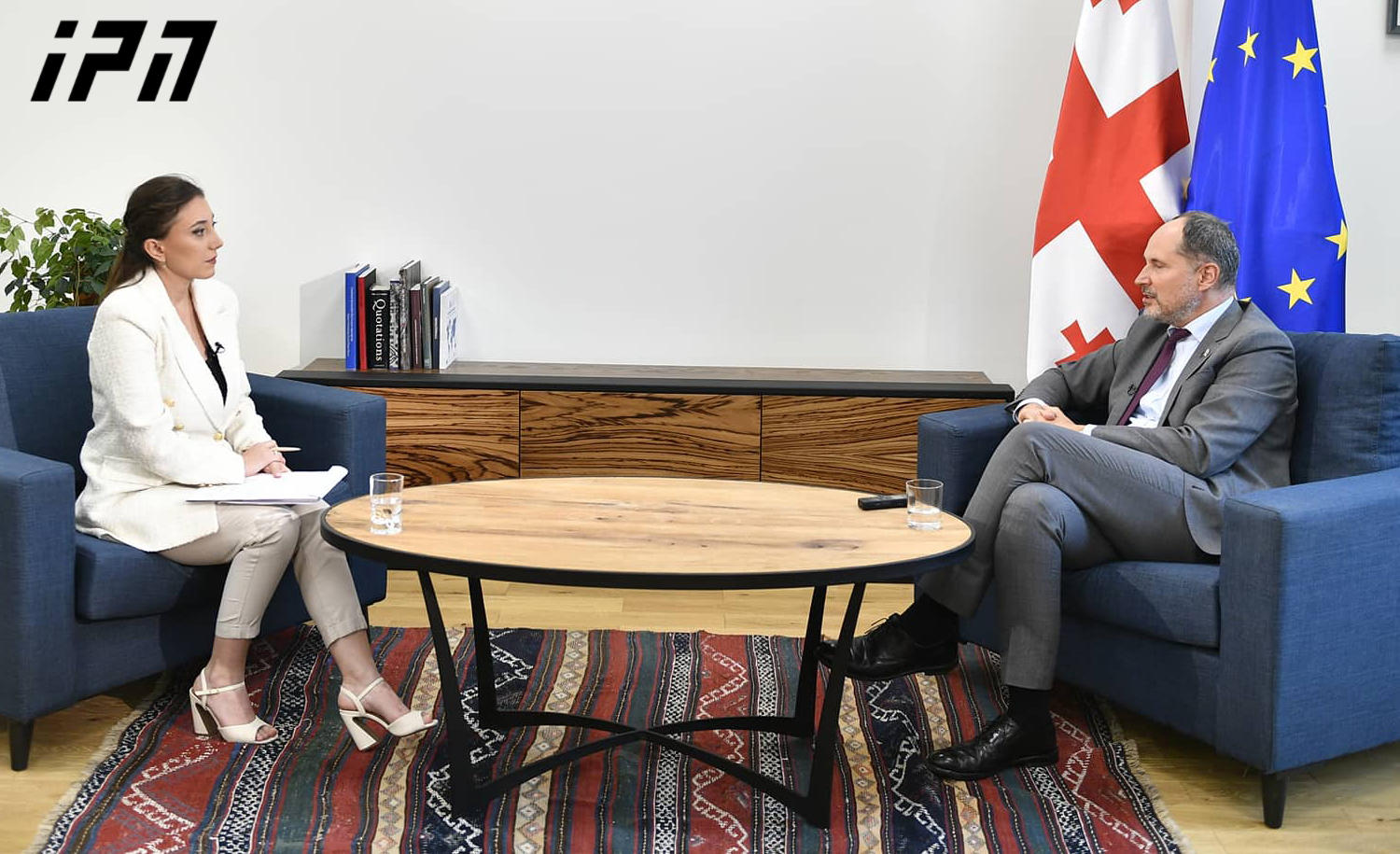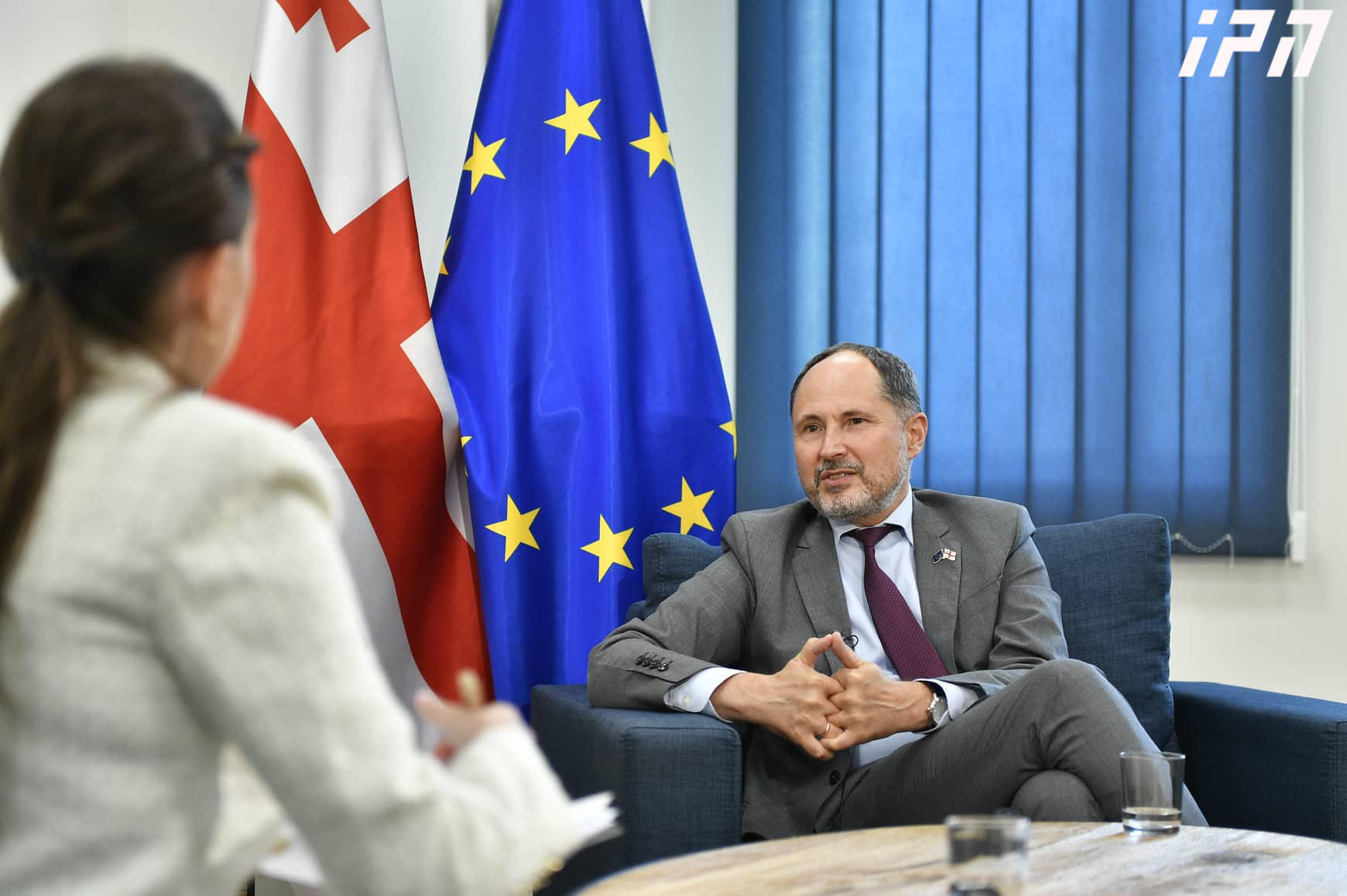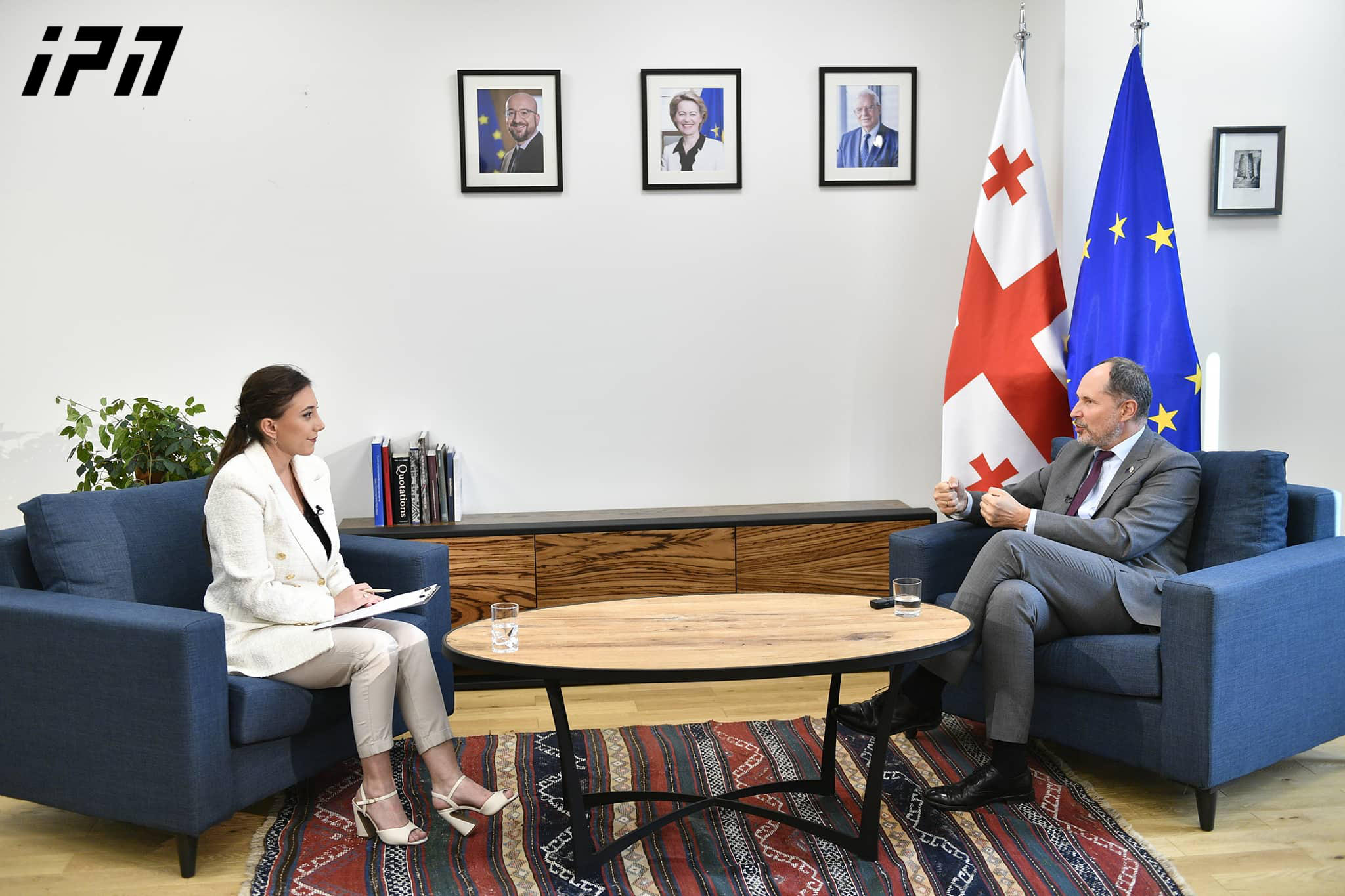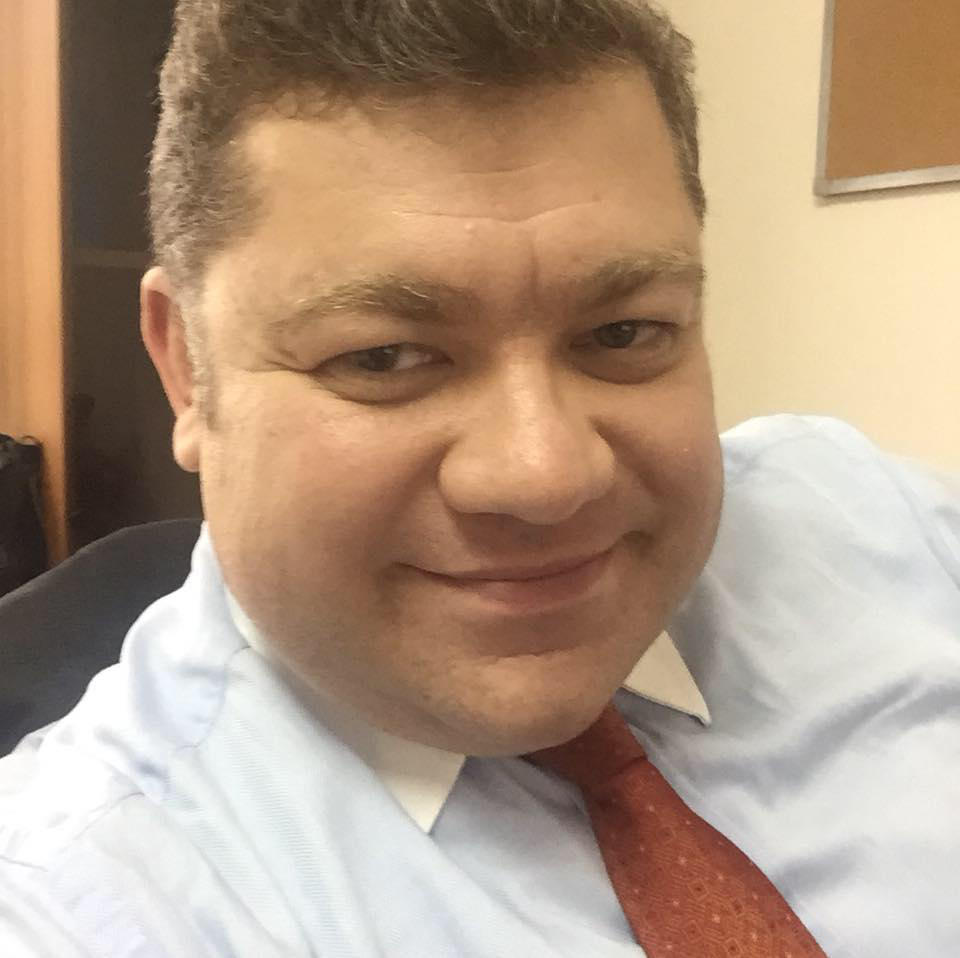EU Ambassador Pawel Herczynski: I really want to help to make sure that the unique window of opportunity is fully used - I hope that at the end of my mission, I will look back with real satisfaction

I really wanted to be in a place where history is made - this is how the new EU Ambassador Pawel Herczynski explains his desire to work in Georgia, for which, as he himself says in an exclusive interview with IPN, he had to face a lot of competition. The Ambassador believes that an important window of opportunity is now open for Georgia, which cannot be missed, although he understands that the process will be full of challenges.
What does he think about the political situation in the country, how does he assess Georgia's positioning in the light of the challenges created by Russia's brutal war, and how logical are the accusations about "the second front" - the head of the EU delegation discusses these and other issues in his first interview after assuming his duties in Georgia.
You have the experience of working in Brussels and New York in quite responsible positions at different times. You were the Managing Director of the Common Security and Defence Policy and Crisis Response Directorate at the EU External Action Service, and before that you held the positions of the Head of the Polish Representation to the Political and Security Committee in Brussels, Deputy Permanent Representative of Poland to the United Nations and Deputy Director of the European Union Department at the Polish Ministry of Foreign Affairs. Therefore, it is interesting to us, why was it important for you to be the Head of the EU Delegation in Georgia?
Thank you for this question. And thank you for the opportunity to have my first interview after assuming my new duties as EU ambassador in Georgia. It's it's a great privilege for me to serve here in Tbilisi, and to represent the European Union. You mentioned different steps of my diplomatic career. And it's true that Georgia, and, and Georgian and issues have been always very close to me. In my last capacity in Brussels, I was responsible for security and defence in the European External Action Service, which is "Ministry of Foreign Affairs" of the European Union. And actually, I came here at the beginning of the year. And I had many meetings on security and on defence. And we were trying also to secure EU support for Georgian Armed Forces, which is now ongoing. In the past, I had a great privilege of taking part in the negotiations on the Association agenda, on the free trade agreement and on visa liberalisation with Georgia. Within the council, there were a lot of discussions among EU member states. At that time, I was representing my home country, Poland. And we were really pushing for Georgia to become an Associated country with the European Union. Before that, as you mentioned, I was in New York, working at the permanent representation of Poland to the United Nations. And I arrived in New York in the summer of 2008. And 2008 War was one of my biggest challenges immediately after arrival. I was also working at NATO. And I was responsible for Partnership for Peace and Euro Atlantic Partnership Council. And again, Georgia and working with Georgia was one of the key objectives. So Georgia has been present throughout my professional career. And from that point of view, it was crystal clear for me that Georgia is a place where I would like to represent the European Union. Maybe I'm sharing a small secret, but among different EU delegations, EU embassies, Georgia was the most competitive. So the biggest number of applicants from 27 EU Member States was to become head of EU Delegation in Tbilisi. And I consider myself extremely lucky that I have been chosen to be the next EU Ambassador in Georgia. After three weeks of staying in Tbilisi, I can only say that, clearly, it was the right choice. And I'm looking forward to the next four years. And I sincerely hope that I will be participating, helping and assisting Georgia in this extremely important moment of EU-Georgia relations.
I am sure that before you officially started working as the EU Ambassador in Georgia, you knew the nature and intensity of work in Georgia. I would like to ask you, what will be the specifics of your work, what will be your line, and do you intend to be as actively involved in the important political processes relevant for the country, like your predecessor?
Look, I have chosen Georgia, not only because it's an amazing country, it's a beautiful country. It's a great country, great culture. But also because Georgia is in a very important moment of its history. Earlier this year, in June, European leaders have decided to open European perspective for Georgia. This is an amazing window of opportunity for this country. And I really wanted to be part of this great challenge. And I really wanted to be in a place where history is made. And this is what I feel is exactly the situation today in Georgia. Association process has given a Georgia a possibility to get closer to the European Union. But since June, this year, we have entered in a completely new phase. Europe, European perspective has been given to Georgia. It is now up to the Georgians to deliver and to make sure that Georgia will be firmly on a path towards Europe. As an EU Ambassador in Tbilisi, I really want to help, to assist. I really want to talk to all the stakeholders, to the government, to the opposition, to the civil society, to the NGOs, to make sure that this unique window of opportunity is fully used. And I hope that in several years time when I will be at the end of my mission, I will look back with real satisfaction, not only for me, but first and foremost for this beautiful country - to be much closer to the European Union.
What will be your direct personal contribution to this process to help Georgia to achieve its strategic goal?
It is for Georgians to do their homework. It is for Georgians to decide if and how they want to get closer to the European Union. I understand that the Georgian population is overwhelmingly in support of the EU integration. The government and the opposition also are very strongly in favour of the European integration. Me and my team, we are here to help to assist to make sure that the government has full information. And, we will be doing this, we have already been doing this, but it is for the Georgia's to make sure that they own this process.
You just said that it's up to us, up to Georgians how we will do our homework. In your view, how satisfactory is the speed with which the authorities are trying to implement the 12 point recommendations. Do you think the efforts only of the ruling party will be sufficient and what should be done to use the new opportunity the country is facing from the point of view of coming closer to the European Union?
I mentioned the European perspective that has been opened to Georgia. The candidate status, which is the next step in the process, will be granted to Georgia based on certain conditions. European Commission has provided the Georgian side with 12 recommendations, 12 areas where progress needs to be made. I know that the government has a very ambitious plan in order to implement those 12 conditions. But it's not only for the government, it's for everyone across the political lines, to build bridges, and to work constructively in order to make progress in those 12 areas. On side of the government, there needs to be inclusivity. So this process should involve all the stakeholders on side of the opposition, there needs to be a constructive approach. So the opposition needs to work together with the government in order to make sure that the progress is made. So actually, this requires everyone to get together and to work in a spirit of national interest. And I believe that it is possible. There were such examples in the past. I'm coming from a country that went through exactly the same process 25-30 years ago. And in case of Poland, in the 90s, it was possible for everyone to sit around the table. And in spite of the differences that are natural in a democratic system, the main political parties were able to agree on this one overarching priority. And I hope that the Georgian stakeholders, everyone that is involved, will also work in a in a spirit of constructiveness in order to make progress on the 12 recommendations.
In the same context, according to the most optimistic course of developments, when will Georgia receive candidate status?
It's for you to decide. The government has a very ambitious plan. We had a very important meeting a week ago in Brussels, so-called Association Council. Your Prime Minister has informed about the timetable. It's a self-imposed timetable. When it comes to legislation. What is important for us is not only the legislation itself, but also the process, the process needs to be inclusive. The process needs to involve all the stakeholders. This also requires the opposition to take part in this exercise in a constructive manner. And it's also important that Georgians take advantage of the international norm setters - ODIHR, the Venice Commission, that these international standard setters are fully consulted, and their opinions are taken into account. And it's also about implementation. So it's not only the legislation, not only the process leading to the legislation, but also the implementation that will be taken into account. And then, let's see next year when exactly the leaders of the 27 EU member states would come back to the issue, I hope it will be as soon as possible in order to very firmly put Georgia on the path towards European integration.

You spoke about your contribution to the process of achieving the country’s strategic aspirations, however, given the Georgian political reality, it will not be easy. Your predecessor during his work here became subject to criticism not once. When Mr Hartzell’s term expired we heard from the Georgian Dream chairman Irakli Kobakhidze that Carl Hartzell “played only a negative role in the relations between the European Union and Georgia.” I would like to ask you, does this attitude of the Georgian government present discomfort or maybe even a barrier to get actively engaged in the role of a mediator to ease the political problems in the country?
You are right that the path of the European integration is is a challenging process. I'm sure there will be ups and downs. And this is why my plea to the government is to be as inclusive as possible and to involve all the stakeholders. And my plea to the opposition is to be as constructive as possible in order to engage into the process. I know my predecessor and Ambassador Hartselle was a true friend of Georgia. In the four year that he has spent here, he did his best in order to move EU-Georgia relations forward. Of course, they are all always challenges, but I know that he tried his best. On my part, I will do my part and I will try to assist your country, your your people as much as I can, I will try to do my best - always to be of help, always to assist. But at the end, it will be for the Georgians to decide, for the Georgians to come together,and to move forward on that 12 recommendations. And I sincerely hope that this unique window of opportunity, that this unique historic moment will be fully seized, and you will take advantage of it. And I really hope that we will see tangible progress and tangible results as soon as possible.
So from your answer, I can understand that this attitude will not be that much of a barrier, and you will be fully involved in political processes in Georgia.
I'm a diplomat. And it's not my role to be part of the political scene. I need to respect the host country. And this is what I'm planning to do. It's for the Georgian stakeholders to take ownership of the process. And it's my role and the role of the European Union to assist Georgia in any way we can.

Today, the country, as well as the entire political spectrum, faces one of the most important tasks –fulfillment of the EU’s 12-point plan. Perhaps, it can be safely said that the point on depolarization is the most difficult to implement, because despite many attempts to sit around the same table, the actors standing on different sides have not overcome mutual hatred and mutual accusations even knowing that the country's strategic interests depend on this. What is your assessment of this situation? In your opinion, which political side should take the first step towards depolarization and what is the role of the Georgian Dream on the one hand and of the opposition spectrum, on the other?
Look, I have to be very careful here, because I don't want to interfere in internal affairs. It's for the Georgians to decide how they want to take this process forward. What I can say is that we are talking about a historic moment in Georgia in recent history, that there is a window of opportunity for Georgia to be firmly anchored on the path towards the European Union. And I sincerely hope that this moment will be fully seized by everyone in in Georgia. In the two weeks, that I'm here, I reached out to all major stakeholders and I will continue my meetings, I have asked the government side to be as inclusive as possible. I have asked the main opposition party to be as constructive as possible. It is for Georgians to sit down together to reach out to each other, to build bridges and to overcome their differences. Because my conviction is that this moment really needs to be seized, that it would be really a huge mistake to waste this opening given by the European Council, given by the leaders of the European Union, saying that Georgia has a European perspective, that Georgia is part of the European family. I know, from even random conversations that I have, while moving around in Tbilisi, that people really take it very seriously. And European perspective, especially in these very turbulent and uncertain times, is something that should unite the Georgians, should bring everyone together. Again, I can give you an example of my own home country, where we were always very often polarised, but on this particular issue, on the issue of European integration, everyone agreed to work together for the common objective. And I sincerely hope that this will also happen in case of Georgia.

Another issue, which the Georgian government will most likely find difficult to implement, is the point of deoligarchization. I would like to ask you, how can this issue be resolved at the legislative level, maybe you have an example for us?
Look, again, it's for the Georgians to discuss and to agree how to move forward. The issue is very simple. And this is not an issue that is only unique to Georgia, this issue is quite common. In the all post Soviet space, there are vested interests, and there is too much influence of business upon politics. And I think that having less influence of rich businessmen upon politics, would strengthen Georgia, would attract foreign investment, would make sure that this country is attractive for prospective investors. It's for Georgians to decide, and we sincerely hope that the progress will be made also when it comes to this issue.
In parallel to the ongoing process in the Parliament aimed at fulfilling the European Commission recommendations, the largest opposition party, the National Movement is again activating the issue of snap parliamentary elections. Early elections is a mechanism defined by the Constitution, used in democratic countries to get the country out of a political crisis, however, in Georgia, this was evaluated as the opposition’s attempt to overthrow the government. How is the request for early elections evaluated by, you, the new Head of the EU Delegation in Georgia?
I don't think I should comment on this question. It's not for me to enter into internal politics and to comment on the demands of one or another party. So if you allow me, I would prefer not to comment on this question.
During the past months, the Georgian Dream’s relations have become unfavorable not only towards EU and US Ambassadors but with partners in general; individual MEPs were also subject to criticism. The expert community and political circles say that the government is engaged in an anti-Western campaign. From this point of view, all that is happening in our country – does this give you the reason to say that indeed, we are observing an anti-Western propaganda and what impact will this have on Georgia’s integration in EU structures?
I think that European integration is mentioned in the Constitution of Georgia, the government has asked for EU membership during the Association Council. Very positive, forward looking announcements were made. And with the European perspective, we actually wait for Georgia to join the European Union. Even during the last State of the Union speech of the President of the European Commission, which happened only two days ago, three days ago, she mentioned that Georgia belongs to the European family. So we are talking about Georgia trying to join the family. So I hope that this will be the level of the conversation - Georgia trying to join the family of the free democratic, prosperous European countries. And you know, criticism is always healthy. But once you want to join the family, you usually are very careful about how you describe the members of the family. My work here will be very straightforward to help Georgia to get to Europe, to become a member of the family of European nations.
In Georgia there are talks about the desire of "certain external forces" to open a "second front". US Ambassador Kelly Degnan has repeatedly stated that "the US does not want and it is not in the US interest that the war spreads into Georgia." I would like to ask you to comment on this and to tell us, what developments does EU expect in Georgia?
Look, this accusation is so absurd that I don't think I should even comment. It's simply pure nonsense. European Union has been always the strongest supporter of Georgian independence, of Georgian sovereignty, and of Georgian territorial integrity. Let me remind you that last week, our monitoring mission in Georgia celebrated 14th anniversary. It's 14 years that you have EU civilian CSDP mission, making sure that there is stability and there is progress when it comes to breakaway regions, we are also co-chairing Geneva international discussions that aim at resolving this outstanding issue. European Union is a peace project, we have received a Nobel Peace Prize not long ago. So these accusations are are pure rubbish, I'm sorry to be as blunt.
Since the beginning of the war in Ukraine, the government of Georgia has been criticized for not showing sufficient solidarity with our friendly state, which is in war with Russia. In your opinion, how correctly is Georgia positioning in this regard?
Look, on the 24th of February, all of us have woken up to a completely new reality. Things that no one could have imagined have actually happened. Russia's brutal, unjustified invasion of Ukraine is a nightmare. European Union has taken a very clear-cut position, something that was completely unacceptable has happened. We, as European Union, are standing firmly in support of Ukraine. We support Ukraine diplomatically in different organisations, we try to isolate Russia. We are supporting Ukrainian economy. We are also supporting Ukrainian armed forces. Also for the European Union, it was a very difficult choice to make. But we have decided, our member states have collectively decided also to support the efforts of Ukrainian armed forces by providing military assistance to Ukraine. When it comes to the position of the Georgian government, I have to say that at international stage, Georgia behaves like a like-minded country. In all the votes in international organisations, Georgia has been supporting the position of the EU and other like-minded countries. And we count on further support of Georgia. Of course, Georgia has memories of 2008 and the war that has been fought here. We fully understand the sensitivities. We understand Georgian geopolitical location. But I have to admit that both when it comes to words and deeds, we consider Georgia as a like-minded country when it comes to our position vis-a-vis the brutal aggression of Russia in Ukraine.
The National Agency for Combating Corruption in Ukraine drew up a so-called sanctions list, in which 12 out of 15 persons are citizens of Georgia. Among them is the founder of the Georgian Dream and former Prime Minister Bidzina Ivanishvili, who has been officially out of politics for years. What could be the follow-up of the Ukraine’s sanctions’ list - can you tell us something about whether the West, and specifically whether the European Union is considering to impose personal sanctions against these people?
Just for the sake of clarity, let me underline that within the 12 recommendations there are no names, we do not interfere with the internal politics here. We are talking about the process. We are not mentioning any names. When it comes the EU sanctions policy, our sanctions against Russia are the most robust ever. And those decisions are taken by 27 member states based on unanimity, so all member states have to agree. And of course, this needs to be very well documented and very well founded. And so this process of EU sanctions is constantly being updated based on unanimity and based on the solid evidence that needs to always stand behind any entry into the European Union sanctions list.
I would like to thank you for this great opportunity and this great interview with me, Mr. Ambassador. And once again, I wish you successful work here in Georgia.
Thank you very much. It was a great pleasure. I also count on the media to support our collective efforts on the way towards European membership.
Salome Abulashvili
InterPressNews
